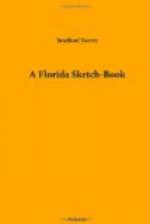further, and an hour or two afterward, on getting
back to the same place, was overtaken again by the
horseman. He pulled up his horse and bade me good-afternoon.
Would I lend him my opera-glass, which happened to
be in my hand at the moment? “I should
like to see how my house looks from here,” he
said; and he pointed across the field to a house on
the hill some distance beyond. “Ah,”
said I, glad to set myself right by a piece of frankness
that under the circumstances could hardly work to
my disadvantage; “then it is your land on which
I have been trespassing.” “How so?”
he asked, with a smile; and I explained that I had
been across his cotton-field a little while before.
“That is no trespass,” he answered (so
the reader will perceive that I had been quite correct
in my understanding of the law); and when I went on
to explain my object in visiting his cane-swamp (for
such it was, he said, but an unexpected freshet had
ruined the crop when it was barely out of the ground),
he assured me that I was welcome to visit it as often
as I wished. He himself was very fond of natural
history, and often regretted that he had not given
time to it in his youth. As it was, he protected
the birds on his plantation, and the place was full
of them. I should find his woods interesting,
he felt sure. Florida was extremely rich in birds;
he believed there were some that had never been classified.
“We have orioles here,” he added; and so
far, at any rate, he was right; I had seen perhaps
twenty that day (orchard orioles, that is), and one
sat in a tree before us at the moment. His whole
manner was most kindly and hospitable,—as
was that of every Tallahassean with whom I had occasion
to speak,—and I told him with sincere gratitude
that I should certainly avail myself of his courtesy
and stroll through his woods.
I approached them, two mornings afterward, from the
opposite side, where, finding no other place of entrance,
I climbed a six-barred, tightly locked gate—feeling
all the while like “a thief and a robber”—in
front of a deserted cabin. Then I had only to
cross a grassy field, in which meadow larks were singing,
and I was in the woods. I wandered through them
without finding anything more unusual or interesting
than summer tanagers and yellow-throated warblers,
which were in song there, as they were in every such
place, and after a while came out into a pleasant
glade, from which different parts of the plantation
could be seen, and through which ran a plantation road.
Here was a wooden fence,—a most unusual
thing,—and I lost no time in mounting it,
to rest and look about me. It is one of the marks
of a true Yankee, I suspect, to like such a perch.
My own weakness in that direction is a frequent subject
of mirth with chance fellow travelers. The attitude
is comfortable and conducive to meditation; and now
that I was seated and at my ease, I felt that this
was one of the New England luxuries which, almost
without knowing it, I had missed ever since I left
home.




